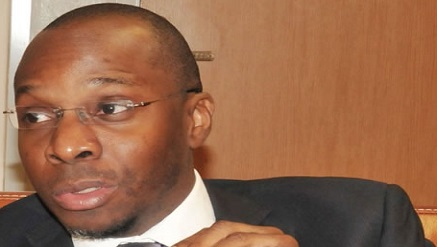General News
Inflation Rises for fifth Consecutive Month to 8.3%

The National Bureau of Statistics (NBS) yesterday released the Consumer Price Index (CPI) for the Month of July stating that increases in the prices of bread, meat and cereals have pushed up the country’s inflation rate to 8.3 per cent
This is the fifth consecutive month of year-on-year increases in the inflation index.
The CPI report noted that the 8.3 per cent recorded in July represents an increase of 0.1 percentage point over the 8.2 per cent recorded in June.
Since a decline of the headline index in January, prices continue to trend upwards, however, at a slow pace increasing by 0.1 percentage points (year-on-year) each month between February and July.
The report said on a month-on-month basis, the highest price increases were recorded in bread and cereals, fruit, and meat groups.
It said, “In July 2014, the CPI which measures inflation, edged higher from the previous month.
“Prices rose by 8.3 per cent (year-on-year), up by 0.1 percentage points from 8.2 per cent recorded in June
“This is the fifth consecutive month of year-on-year increases in the Headline index. The faster pace of price increases recorded in the Headline index were as a result of an increase in multiple divisions that contribute to the Headline index.”
It added however that on a month on month basis, the increases in urban prices eased as Urban Headline index in July increased by 0.70 per cent, indicating 0.1 percentage points lower from the June
Similarly, the NBS noted that rural prices also exhibited the same trend over the period, increasing by 8.1 per cent from eight percent in the preceding month.
As was the trend with urban prices, the Rural All-items index rose at a slower pace by 0.60 percent in July, down from 0.74 percent in June.
The Governor of the Central Bank of Nigeria (CBN) had last month identified pressure from food/core inflation inflation and the risks that could emanate from the likely increase in aggregate spending in the run-up to the 2015 general elections as pressures points to monetary policy stability.
“We are monitoring the situation, monitoring the liquidity situation in the money market; monitor the spending of Nigerians and government to the run up to the elections.
“And as we begin to see that the macro economic variables are moving in the direction that we expect, you will begin to see the reversal in interest rates in the direction where we want to be,” he had said.
General News
Nigeria Approves $500m for AfDB’s Trust Fund Replenishment over Next 15 Years

Nigeria has approved a fresh $500 million replenishment of the Nigeria Trust Fund (NTF) at the African Development Bank (AfDB), extending the facility for another 15 years.

President of the AfDB, Dr. Akinwumi Adesina, announced this during his opening remarks at the ongoing AfDB Annual Meetings in Abidjan as he expressed deep appreciation to President Bola Ahmed Tinubu and Vice President Kashim Shettima for their continued support.
“To President Bola Ahmed Tinubu and to Vice President Kashim Shettima, for your support over the past two years, I am profoundly grateful. Thank you for graciously approving the replenishment of the Nigeria Trust Fund for another 15 years for $500 million.”
The Nigeria Trust Fund (NTF) was set up in 1976 through an agreement between the Nigerian government and the African Development Bank Group. It’s a revolving fund that sustains itself over time and is designed to support the development of low-income African countries in need of concessional financing.
The fund can be used in a number of ways—either to co-finance projects alongside the African Development Bank and the African Development Fund (ADF) or to finance projects independently. It supports both public and private sector initiatives and can also be used to top up funding for ongoing Bank Group-backed projects.
Unlike the ADF, which allocates funds to countries, NTF resources are tied to specific projects. This allows for more flexible, needs-based support where it’s most effective.
General News
Harmonised Tax Bills Ready, May Get NASS Approval Today

The National Assembly has hinted that it may consider passing the harmonised tax reform bills by Tuesday, following a successful review of the troubling clauses in the proposed legislation.

This was disclosed by the Chairman of the House Committee on Finance, James Faleke, via his official X account on Sunday. Faleke is the leader of the House delegation for the bills harmonisation exercise.
He tweeted, “The conference committee set up by the House and the Senate on the Tax Reform Bills has successfully concluded its work. The joint committees thoroughly reviewed all sections and addressed the grey areas of the four bills, examining each clause strategically and resolving contentious issues.
“After an intensive deliberation that stretched through Thursday night, all day Friday, and into the early hours of Saturday, I am pleased to report that the bills are now ready for presentation to both the House and the Senate for final passage.
“I would like to especially appreciate the Senate conference committee, ably led by the Chairman of the Senate Committee on Finance, the Distinguished Senator Sani Musa, as well as all members of the Senate Conference Committee.
“I also extend heartfelt gratitude to my colleagues on the House Conference Committee, which I had the honour to lead, for their unwavering commitment to the Nigerian people. We are truly grateful for your dedication and resilience in bringing this important task to a conclusion.”
It was reported that the four tax bills were sent two weeks ago to the joint harmonisation committee made up of members of the Senate and the House of Representatives to reconcile the amendments of both Chambers before it is transmitted to President Bola Tinubu for his assent.
After announcing the passage of the bills following a majority voice vote, the Senate President, Godswill Akpabio, praised the lawmakers for their sacrifice in ensuring that the tax system in Nigeria meets an international standard.
He said, “These four executive bills seek to transform and modernise the tax system in Nigeria.”
The move came barely 24 hours after the Upper Chamber earlier cleared two of the bills before pushing the remaining legislation for consideration on Thursday.
Addressing journalists after the plenary, the Chairman of the ad hoc committee for the tax reform bills and the lawmaker representing Niger East Senatorial District, Senator Sani Musa, explained that they did their best to ensure the taxation system in Nigeria meets international standards.
Musa also disclosed that parts of the tax proceeds will be used to fight cybercrime, boost defence infrastructure, the TETfund, and aid soldiers in their efforts to restore peace and safety in the country.
Continuing, the Niger Senator explained that the senators recommended that the President needs to appoint a chairman and create an ombudsman to arbitrate and adjudicate on tax-related matters.
The legislator also harped on the need for the establishment of a tax tribunal, which he said cannot be overemphasised.
“It is not à court of record. We have looked at the issue of VAT, coĺlection of taxes, development levies, and inheritance tax, which had been expunged.
“I believe Nigerians wiĺl see something nice from this. We also commend the President for giving a level playing field to all,” he said.
General News
Google I/O 2025 Showcases Temu’s Innovations in Digital Shopping with Web UI Primitives

E-commerce platform highlighted as a case study in applying Google’s latest Web UI primitives to enhance interactivity and performance in online shopping experiences.

Temu was featured at Google I/O 2025 as an early adopter of Google’s new Web UI primitives—a set of Web UI APIs designed to improve interactivity, performance, and responsiveness in web applications. The e-commerce platform was presented at the conference as a case study for implementing these technologies to deliver a more dynamic and engaging digital shopping experience.
Google I/O is Google’s premier annual developer conference, where the company unveils its latest products, showcases innovations across its portfolio, and shares its vision for the future of technology.
This year, the conference’s focus includes new Web UI primitives designed to simplify the development of common yet complex components—such as Carousels, Tooltips, and Drop-down menus—to create more seamless and responsive user experiences.
“Temu, the e-commerce company, has been setting the bar when it comes to applying these new primitives to their full potential,” said Paul Kinlan, Lead of Chrome Developer Relations at Google I/O 2025. “The web is becoming more stylish and responsive every single day.”
Since integrating the MPA View Transitions API, Temu has seen a 10% increase in user session duration and a 15% rise in page views, according to Paul Kinlan’s presentation. The platform has also been piloting several new APIs—including Carousels, Popover, Anchor Positioning, and Customizable Select—which have improved page performance and reduced CPU load by 10–15%, helping to lower device battery consumption and interactivity latencies. Google also highlighted its collaboration with Temu to enable next-generation capabilities for select features.
Temu has been actively adopting cutting-edge technologies to enhance customers’ digital shopping experiences. It was one of the first developers to optimize its app for the Google Pixel Fold and integrate Android’s “dialog full-screen dim” feature, earning recognition from Google. Temu is listed as an Editors’ Choice on the Google Play Store.
Since its debut in September 2022, Temu has rapidly expanded to over 90 markets worldwide, offering a diverse range of merchandise at highly competitive prices. Temu was named a top Apple-recommended app of 2024 and operates one of the most visited e-commerce websites in the world.

 E-Business3 days ago
E-Business3 days agoNigeria Launches Cybercrime Team with Commonwealth, UK Support

 Telecom3 days ago
Telecom3 days agoTelecom Subscribers Decline By 43m in One Year

 Telecom3 days ago
Telecom3 days agoNCC Orders Telcos to Compensate Subscribers for Outages More than 24 Hours

 E-Financial3 days ago
E-Financial3 days agoSERAP Drags CBN to Court over Alleged Failure to Disclose LG Allocations

 General News3 days ago
General News3 days agoHEDA Sues FG, Oil Giants over Alleged Unlawful Oil Licence Transfer

 E-Financial2 days ago
E-Financial2 days agoEFCC Recovers over N20Bn Stolen by Hackers from 6 Banks in Nigeria

 Telecom2 days ago
Telecom2 days agoEngr. Ikechukwu Nnamani Receives Two Prestigious @ABoICT Awards

 Telecom3 days ago
Telecom3 days agoIHS Nigeria, NSCDC Partner to Protect Telecoms Infrastructure
























